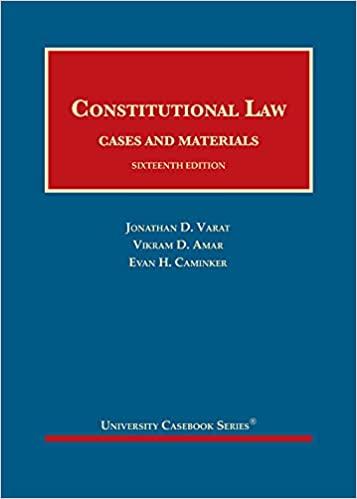Question
Part 1 Molly has been a local newspaper reporter for over 10 years. She learned that Joe Thompson, a candidate for governor, had been arrested
Part 1
Molly has been a local newspaper reporter for over 10 years. She learned that Joe Thompson, a candidate for governor, had been arrested for shoplifting 20 years earlier. She also learned that early in his life, Thompson went through a confused period when he did things he later regretted. The shoplifting was treated as a minor offense and removed from his record. Since then, Thompson has had a distinguished career helping people and leading important community projects. Many people consider him to be the best candidate who will likely go on to other important leadership positions. Molly wonders whether she should write a story about Joe's earlier troubles, which could ruin his chance to win.
Can you characterize Molly's thinking in terms of cognitive moral development levels? Which of the following questions represents preconventional, conventional, and principled thinking?
- Are there any laws against writing the story?
- Would getting "the scoop" help or hurt my career?
- If I don't publish the story, wouldn't another reporter write the story anyway?
- What action would best serve society in the long term?
- How would my boss react if I wrote, or didn't write, the story?
- Aren't reporters expected to report all the news regardless of the circumstances?
- Would Thompson pay me not to write the story?
- Would the election process be more just with or without reporting
Part 2
"In just about every gangster movie there is a scene where the mob boss says, 'Hey, I'm just a businessman." William Hageman
Steven F. Goldstone, chairman and CEO of RJR Nabisco (one of the four biggest U.S. cigarette manufacturers), said in a 1998 magazine interview, "I have no moral view of this business ... I viewed it as a legal business. You shouldn't be drawing a moral judgment about a business our country says is perfectly legal and is taxed like crazy by it." Think about Goldstone's statement in terms of ethical awareness. What might happen if he began thinking about his business in ethical, and not just legal, terms?
Give your view on the question.
WILL NOT USE WORK AS OWN
Step by Step Solution
There are 3 Steps involved in it
Step: 1

Get Instant Access to Expert-Tailored Solutions
See step-by-step solutions with expert insights and AI powered tools for academic success
Step: 2

Step: 3

Ace Your Homework with AI
Get the answers you need in no time with our AI-driven, step-by-step assistance
Get Started


